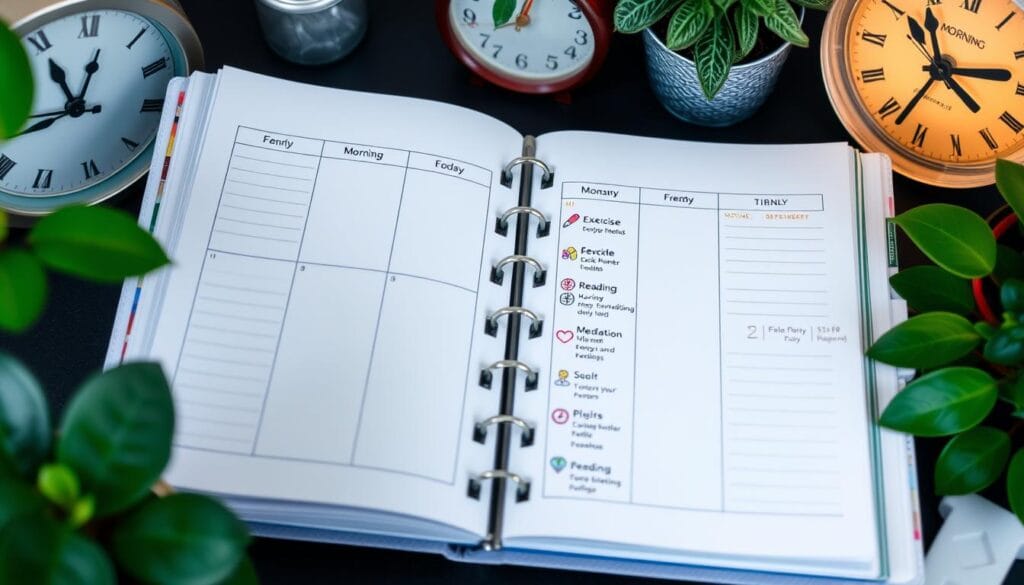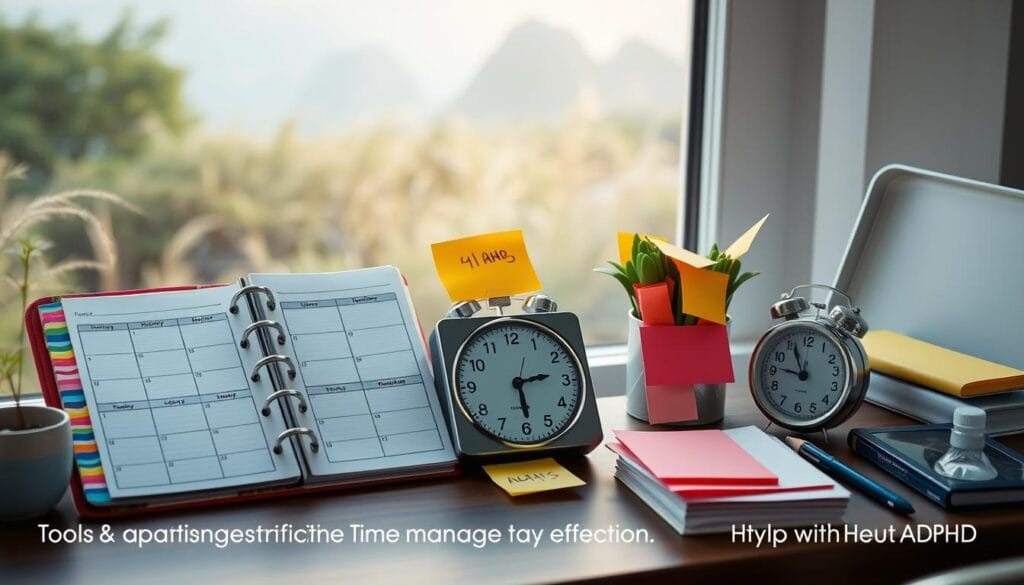Did you know that over 366 million people worldwide are estimated to have ADHD? With a few simple changes to daily habits, managing ADHD symptoms can become easier. Learn how small adjustments can improve focus and boost well-being with these practical tips.
Good habits can really help those with ADHD. We’ll talk about morning routines, time management, and making your workspace better. This article will show you how to manage ADHD with simple, everyday habits. Get ready to change your life and thrive with ADHD.
Table of Contents
Understanding ADHD and the Power of Habit Formation
If you’re dealing with ADHD, setting up daily routines and habits can really help. ADHD makes it hard to focus, control impulses, and stay organized. But, forming habits can change the game for managing ADHD.
ADHD affects how the brain works, making it hard to plan and follow through. By creating habits, you use your brain’s ability to automate tasks. This frees up your mind for more important things. Starting your day with a routine can give you structure and control.

Also, habits can help with impulsivity and distractions that ADHD brings. Once a habit is formed, like taking breaks or practicing mindfulness, it’s easier to keep up. This way, you can manage your ADHD symptoms and do well in your daily life.
Morning Routines That Set You Up for Success
If you have ADHD, a good morning routine can change your day. It helps you focus and be productive. This sets you up for success.
Wake up at the same time every day. This helps your body get into a rhythm. It makes you more focused and alert.
After waking, do things that help with ADHD. This could be meditation, eating well, or exercising. These activities boost your energy and focus.

Use ADHD-friendly morning habits like the Pomodoro method. These methods help you stay on task. Find what works best for you.
Good morning habits lead to a better day. Stick to your routine. You’ll see your focus and well-being grow.
Best Habits to Improve ADHD Through Time Management
Managing time well is key for those with ADHD. By using smart time management, you can do more, feel less stressed, and use your brain’s strengths.
Time blocking is a great tactic. It means setting aside specific times for tasks. This keeps you on track and away from distractions. The Pomodoro Technique is another winner. It’s about working in 25-minute chunks, then taking a short break. This method can really help you stay focused.

Visual schedules can change the game for ADHD folks. They make your day clear and easy to follow. This helps a lot with big tasks or switching between things.
Good time management for ADHD isn’t about being perfect. It’s about finding what works for you. Try different methods and be kind to yourself as you learn.
Creating an ADHD-Friendly Workspace Environment
For people with ADHD, making a workspace organized can be hard. But, with a few easy steps, you can make a space that helps you focus. It’s important to work on your organizational skills to manage ADHD better.
First, clean up your workspace. Get rid of things you don’t need. Keep only what’s important close by. This cuts down on distractions and makes finding things easier.
Then, think about getting storage like labeled bins or shelves. They help keep your stuff organized and easy to find.

Use visual reminders to help with ADHD. Bright sticky notes or whiteboards are great for reminders and to-do lists. They help you stay on track and feel accomplished as you complete tasks. Also, a timer or digital assistant can help you manage time and stay focused.
Creating a workspace friendly for ADHD can reduce distractions and boost your productivity. Small changes can help a lot in managing ADHD symptoms and achieving success.
Exercise and Physical Activity Strategies for ADHD Management
If you have ADHD, regular exercise can really help. It improves focus, cuts down on hyperactivity, and boosts brain function. Adding simple exercises to your daily routine can manage ADHD symptoms and boost productivity.
Start your day with a quick workout. A brisk walk, some yoga, or jumping jacks can energize you. Taking short breaks to exercise throughout the day keeps you alert and focused. Use a timer to remind you to move every hour.
Choose activities that challenge both your body and mind. Aerobic exercises like swimming, cycling, or jogging are great. They improve heart health and release happy hormones. Strength training, like bodyweight exercises or resistance bands, also helps with focus and discipline.
It’s important to enjoy the activities you choose. Try different ones to find what works for you. Regular exercise is key to better focus, less hyperactivity, and a healthier life.
Nutrition and Diet Habits That Support ADHD Brain Function
Your diet is key in managing ADHD. The right foods can help your brain work better and reduce symptoms. Let’s look at the best foods for ADHD and how to eat for better focus.
Start with a balanced breakfast. Include protein, complex carbs, and healthy fats. This mix keeps your blood sugar steady and gives you energy. Try overnight oats with berries, nut butter, and Greek yogurt, or a veggie-packed omelet with avocado.
Eat whole, nutrient-rich foods. Omega-3s in salmon, walnuts, and flaxseeds are good for your brain. Antioxidant-rich foods like blueberries, spinach, and bell peppers also help.
Drinking water is important for your brain. Drink lots of water to help your brain work better and avoid dehydration, which can make ADHD worse.
By eating well, you can improve your brain health and manage ADHD better. A balanced diet is just part of it. Adding other lifestyle changes can help even more.
Mindfulness and Meditation Practices for Better Focus
People with ADHD often find it hard to stay focused. But, mindfulness and meditation can really help. They teach you to be in the moment and calm your mind.
Mindfulness helps you control your impulses. It lets you think before acting. Meditation boosts your ability to switch between tasks easily.
Starting mindfulness and meditation is easy. Just start with a few minutes of deep breathing each day. Apps like Calm or Headspace offer guided meditations for ADHD.
Adding mindfulness and meditation to your day can greatly help with ADHD. With time and effort, you’ll see better focus and calmness.
Sleep Hygiene Habits for ADHD Management
For people with ADHD, a regular sleep routine is key. Quality sleep helps manage symptoms and boosts well-being. Set a fixed bedtime and wake-up time, every day, including weekends. This helps your body’s clock stay in sync.
Creating a sleep-friendly space is also vital. Make your bedroom cool, dark, and quiet. This reduces distractions that can mess up your sleep. Don’t use phones or tablets in bed, as their blue light can affect your sleep cycle.
If you have trouble sleeping, try relaxation techniques. Deep breathing, muscle relaxation, or guided imagery can calm your mind. They help improve sleep quality.
FAQ
Q: What are some of the best habits to improve ADHD symptoms?
A: Good habits can really help with ADHD. Start with a morning routine. Use time management tools and make a workspace that works for you.
Exercise regularly and eat well. Mindfulness can also help a lot.
Q: How can daily routines help individuals with ADHD?
A: Daily routines are super helpful for ADHD. They give structure and reduce stress. They also help you stay focused and productive.
Q: What time management strategies work well for people with ADHD?
A: For ADHD, use visual schedules and time blocks. Try the Pomodoro Technique and prioritize tasks. These strategies cut down on procrastination and boost productivity.
Q: How can an ADHD-friendly workspace environment improve focus?
A: An ADHD-friendly workspace boosts focus and productivity. Keep it clean and organized. Remove distractions and use visual cues to help you stay on track.
Q: What types of exercise are particularly beneficial for individuals with ADHD?
A: Exercise is key for ADHD. Aerobic activities like running or swimming are great. Sports like basketball or dance also help.
Q: How can diet and nutrition impact ADHD symptoms?
A: Eating well is important for ADHD. Choose foods that keep your blood sugar stable. Avoid processed or sugary foods that can make symptoms worse.
Q: What mindfulness and meditation practices can help individuals with ADHD?
A: Mindfulness and meditation are great for ADHD. They improve focus and reduce impulsiveness. Try deep breathing, body scans, or guided meditations.
Q: How can good sleep hygiene habits benefit ADHD management?
A: Good sleep habits are essential for ADHD. Stick to a regular sleep schedule. Make your bedroom sleep-friendly. Address any sleep problems linked to ADHD.

